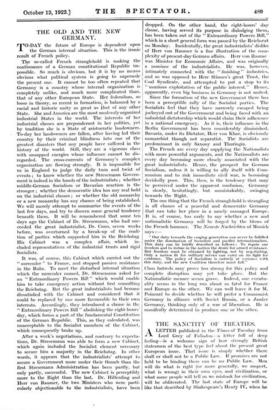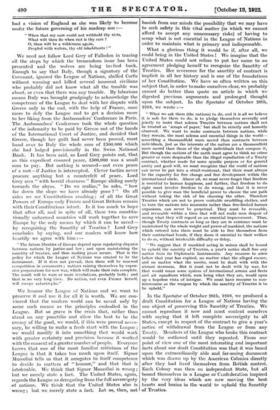THE SANCTITY OF TREATIES.
ALETTER published in the Times of Tuesday from Lord Grey of Fallodon—a letter full of deep feeling—is a welcome sign of how strongly British statesmen of the best type feel about the present great European issue. That issue is simply whether there shall or shall not be a Public Law. If promises are not held to be binding there can be no Public Law. Men will do what is right (or more generally, we suspect, what is wrong) in their own eyes, and civilization, or what some people will tell us we mistook for civilization, will be obliterated. The last state of Europe will be like that described by Shakespeare's Henry IV„ when he had a vision of England as she was likely to 'become under the future governing of his madcap son :— "When that my care could not withhold thy ridts, What wilt thou do when riot is thy care ? 0, thou wilt be a wilderness again, Peopled with wolves, thy old inhabitants !"
We need not follow Lord Grey of Fallodon in tracing all the steps by which the tremendous issue has been presented and the wolves are being invited back. Enough to say that Italy, though a signatory of the Covenant, ignored the League of Nations, shelled Corfu without warning and killed .several innocent civilians who probably did not know what all the trouble was about, or even that there was any trouble. By laborious means Italy was brought grudgingly to acknowledge the competence of the League to deal with her dispute with Greece only in the end, with the help of France, once more to defy the League and to get -a decision more to her liking from the Ambassadors' Conference in Paris. The Ambassadors' Conference took the whole question of the indemnity to be paid by Greece out of the hands of the International Court of Justice, and decided that Greece, though her guilt had never been proved, must hand over to Italy the whole sum of £500,000 which she had lodged provisionally in the Swiss National Bank. It has been said, as Lord Grey points out, that as this expedient ensured peace, £500,000 was a small sum to pay. But nothing is secured—not even peace of a sort—if Justice is intercepted. Clever tactics never procure anything but a counterfeit of peace. Lord Grey sees "with horrid clearness" Europe sliding surely towards the abyss. "Do we realize;" he asks, "how far down the slope we have already gone ? " On all sides we see Constitutions crashing ; of all the Great Powers of Europe only France and Great Britain remain with their Constitutions intact. Is it too much to hope that after all, and in spite of all, these two constitu- tionally unharmed countries will work together to save Europe by the only means by which it can be saved— by recognizing the Sanctity of Treaties ? Lord Grey concludes by saying, and our readers will know how heartily we agree with him :— "The future liberties of Europe depend upon regulating disputes between nations by justice and law ; and upon maintaining the sanctity of treaties, and thus making peace secure. That is the policy for which the League of Nations was created to be the instrument. If it does not prevail, then there will be renewed competition in armaments ; nations ruining themselves by expen- sive preparations for new war, which will make their ruin complete. The result will be wars or more 'revolutions, probably both ; and that in no very long time. No nation, not even France herself, will escape catastrophe."
We honour the League of Nations and we want to preserve it and use it for all it is worth. We are con- vinced that the modern world can be saved only by some such means as the principles embodied in the League. But so grave is the crisis that,. rather than stand on any punctilio and allow the best to be the enemy of the good, we would, if this were proved neces- sary, be willing to make a fresh start with the League ; we would modify it into something that would work with greater certainty and precision because it worked with the consent of a greater number of people. Everyone knows that one of the most familiar criticisms of the League is that it takes too much upon itself. Signor Mussolini tells us that it arrogates to itself competence to decide in matters of "honour," and that that is intolerable. We think that Signor Mussolini is wrong ; but we merely state a fact. The United States, again, regards the League as derogating from the full sovereignty of nations. We think that the -United -States also is wrong ; but we merely state a fact. Let us, -then, not- banish from our minds the possibility that we may have to seek safety in this vital matter (in which we cannot afford to accept any unnecessary risks) of having to scrap what is not essential in the League of Nations in order to maintain what is primary and indispensable.
What a glorious thing it would be if, after all, we could bring in the United States I We imagine that the United States could not refuse to put her name to an agreement pledging herself to recognize the Sanctity of Treaties. Her reverence for the sanctity of contract is implicit in all her history and is one of the foundations of her Constitution. We have so often written on this subject that, in order to make ourselves clear, we probably cannot do better than quote an article in which we digested previous arguments and prolonged thought upon the subject. In the Spectator of October 26th, 1918, we wrote :— " What we ask them (the nations) to do, and it is all we believe it is safe for them to do, is to pledge themselves severally and jointly to insist that solemn Treaties between nations shall not be treated as 'scraps of paper,' but shall be strictly and honestly observed. We want to make contracts between nations, while they remain, the most solemn and essential things in the world— something a thousandfold more sacred than contracts between individuals, just as the interests of the nation are a thousandfold more sacred than those of the single individuals that compose it. But though the nations of the earth must agree to think no crime greater or more despicable than the illegal repudiation of a Treaty contract, whether made for some specific purpose or for general amity and good will, we must recognize that the world of nations can never be put into a strait-waistcoat, that there must always be the capacity for free change and free development within the international circle. Above all, we must never forget that freedom is essential to human happiness, and further, that freedom to do right must involve freedom to do wrong, and that it is never possible to give man the beneficial power to choose the one path without taking the risk of his choosing the other. Therefore Treaties which are not to prove veritable swaddling clothes, and to turn the nations into mtunmies rather than free-limbed human organisms, can never be perpetual. They must be revocable, and revocable within a time that will not make men despair of seeing what they will regard as an essential improvement. Thus, though Treaty contracts as long as they are in existence must be maintained by the whole weight and power of mankind, the nations which entered into them must be able to free themselves from their contractual bonds, if they deem it essential to their welfare to do so, without intolerable difficulty or delay.
"We suggest that if mankind acting in unison shall be bound to uphold the sanctity of Treaties, a year's notice shall free any nation from its Diplomatic Instruments. Any recourse to arms before that year has expired, no matter what the alleged excuse, and no matter what the merits, must be dealt with with the utmost sternness. But it must not be dealt with by war, for that would mean some system of international armies and fleets and air squadrons which, men being what they arc, would open up a hopeless vista of intrigue. We must have recourse to non- intercourse as the weapon by which the sanctity of Treaties is to be upheld."
In the Spectator of October 26th, 1918, we produced a draft Constitution for a League of Nations having the one object of preserving this Sanctity of Treaties. We cannot reproduce it now and must content ourselves with saying that it left complete sovereignty to all States, except in respect of the contract to give a year's notice of withdrawal from the League or from any Treaty. Members of the League who broke this contract would be outlawed until they repented. From our point of view one of the most interesting and important facts about our draft Constitution was that it was based upon the extraordinarily able and far-seeing document which was drawn up by the American Colonies directly after they had freed themselves from British control. Each Colony was then an independent State, but all bound themselves in a League -or Confederation inspired by the very ideas which are -now moving the best hearts and brains in the world to uphold the Sanctity of Treaties.



























































 Previous page
Previous page